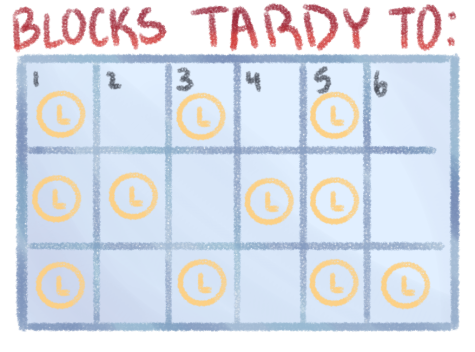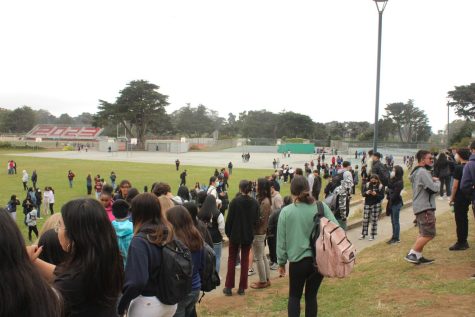First block attendance should not affect a student’s grade

The steady growl of the train as it rolls through the tunnel stops suddenly. This doesn’t bother me, but after ten minutes pass and the train is still frozen in the same place as before, I start to get weary of the time. The train finally starts moving again and I arrive at Lowell. I mentally prepare myself to walk into my first block class ten minutes late, anticipating the stares from all of my classmates and teacher. When I get to the door of my classroom, I push to open it, only to realize that it’s locked. A group of my classmates lean against the lockers outside of the class, just as confused as I am. A few minutes later, my teacher opens the door and scans us all with a sour expression on his face.
After class, I learned that while we were locked outside, my classmates had a quiz about the color of an object on my teacher’s desk. All of us received a zero for the assignment on Synergy. This situation demonstrates a trend at Lowell I have noticed since my first day here. First block teachers are very strict on punctuality, often taking their frustration out on late students by lowering their grades. Lowering a student’s grade to their first block class because of punctuality is not fair because it does not account for outside circumstances that are beyond a student’s control.
Teachers should not go out of their way to penalize students for circumstances they have no control over.
Teachers need to be flexible and understanding with attendance. I understand that my teacher did not break any rules. He is allowed to lock his door. He is allowed to assign any quiz he wants. But teachers should not go out of their way to penalize students for circumstances they have no control over. By locking the door and wasting students’ time with a pointless quiz, my teacher took precious time away from our learning. By targeting students who are late to their first class of the day, my teacher demonstrated a lack of empathy and concern for his students’ wellbeing.
Many teachers at Lowell seem to expect their students to prioritize their class above all else. However, everyone has a different home life, a different route to get to school, and different challenges that may slow them down in the mornings or keep them up at night. A student should not have to go to the school and ask for accommodations to be treated with understanding. School is important, but there are a million things that a student may need to prioritize over it to protect their own mental and physical health. This should be encouraged by teachers. Instead, too many teachers at Lowell punish students for frequent tardies and absences.

My parents have jobs that start early in the mornings on most days, preventing them from being able to drive me to school. This means that I take public transportation, so my punctuality depends on the speed and frequency of MUNI, which is not reliable. It usually takes me around 45 minutes to get to school, which is much shorter than many other students’ routes to school. Students who get driven to school by someone else rely on the punctuality of another person to get to school on time, a factor that they have zero control over. If they carpool, the risk of someone being late is higher.
Beyond the actual method of transportation, there is an endless list of things that may interfere with a student’s punctuality. Many students have family members who they must help in the mornings before they can leave. Aema Westphal has a younger brother who she helps get ready and then takes to school every morning. After that Westphal takes the 18 bus to school, which is known for being irregular and, at best, coming in 20 minute intervals.
Many students have extracurriculars that can interfere with attendance. Shanice Lam plays on four different sports teams for three different sports. On top of that, she coaches, babysits, and tutors. This means she is frequently busy until 10:30 pm every night, and then must do homework, forcing her to stay up late. Lam works hard to prioritize school on top of everything, but is sometimes late in the mornings because of her very busy nights. On top of that, she frequently misses school for tournaments. Many other students have similar schedules, and should not be forced to give up their passions because teachers refuse to be flexible.
Students need to be allowed to prioritize their wellbeing and education while at school, and not be stressed about the consequences of a tardy to their first block class.
School attendance is important. If a student does not show up to school, their learning will be affected. And students walking in halfway through a class is understandably annoying to a teacher. However, there is a difference between a student showing up to their first class late because of a reason beyond their control, and a student losing track of time while at Stonestown during lunch and being late to their next class. Both circumstances deserve empathy and understanding that there may be a valid reason for the tardiness, however tardiness to first block is almost guaranteed to be beyond the student’s control. By punishing students for this, teachers are disproportionately hurting the students who have challenges outside of school. Any adult who works with kids should be expected to have a basic level of empathy and care for their students. And anyone who has those attributes should not have a problem adjusting their attitude around attendance to accommodate their students’ best interests. Students need to be allowed to prioritize their wellbeing and education while at school, and not be stressed about the consequences of a tardy to their first block class.

Sia is a Senior at Lowell. You can find her at Peet’s almost every day after school, with the same latte order. She wants to learn latte art some day, that way she can work at a cafe and make designs in the drinks.

You can usually find Dary blasting music in her airpods and speed walking around in outfits she spent too much time thinking about, or that embodies the Adam Sandler within her. She loves to chat, so feel free to say hi or ask for help!🍵











